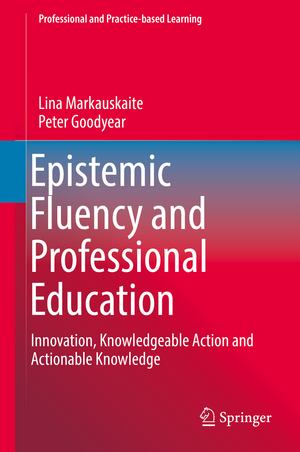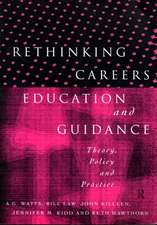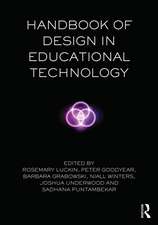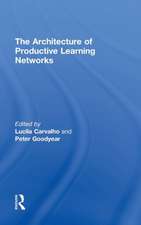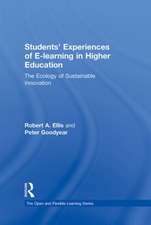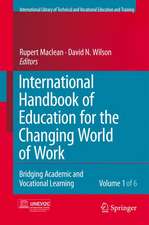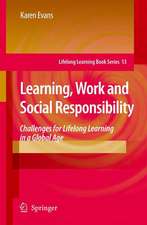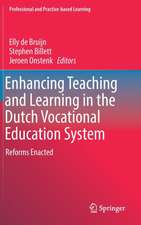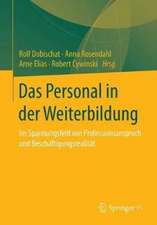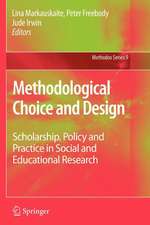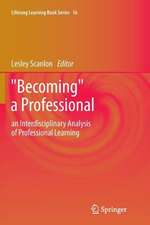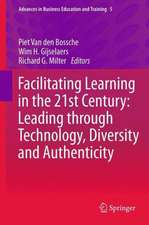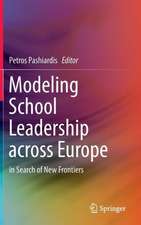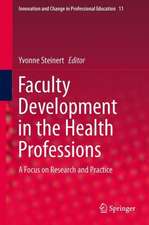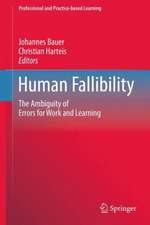Epistemic Fluency and Professional Education: Innovation, Knowledgeable Action and Actionable Knowledge: Professional and Practice-based Learning, cartea 14
Autor Lina Markauskaite, Peter Goodyearen Limba Engleză Hardback – 3 oct 2016
This book, by combining sociocultural, material, cognitive and embodied perspectives on human knowing, offers a new and powerful conceptualisation of epistemic fluency – a capacity that underpins knowledgeable professional action and innovation. Using results from empirical studies of professional education programs, the book sheds light on practical ways in which the development of epistemic fluency can be recognised and supported - in higher education and in the transition to work.
The book provides a broader and deeper conception of epistemic fluency than previously available in the literature. Epistemic fluency involves a set of capabilities that allow people to recognize and participate in different ways of knowing. Such people are adept at combining different kinds of specialised and context-dependent knowledge and at reconfiguring their work environment to see problems and solutions anew.
In practical terms, the book addresses the following kinds of questions. What does it take to be a productive member of a multidisciplinary team working on a complex problem? What enables a person to integrate different types and fields of knowledge, indeed different ways of knowing, in order to make some well-founded decisions and take actions in the world? What personal knowledge resources are entailed in analysing a problem and describing an innovative solution, such that the innovation can be shared in an organization or professional community? How do people get better at these things; and how can teachers in higher education help students develop these valued capacities? The answers to these questions are central to a thorough understanding of what it means to become an effective knowledge worker and resourceful professional.
| Toate formatele și edițiile | Preț | Express |
|---|---|---|
| Paperback (1) | 1234.00 lei 6-8 săpt. | |
| SPRINGER NETHERLANDS – 15 iun 2018 | 1234.00 lei 6-8 săpt. | |
| Hardback (1) | 1240.30 lei 6-8 săpt. | |
| SPRINGER NETHERLANDS – 3 oct 2016 | 1240.30 lei 6-8 săpt. |
Din seria Professional and Practice-based Learning
- 18%
 Preț: 887.24 lei
Preț: 887.24 lei - 18%
 Preț: 891.48 lei
Preț: 891.48 lei - 18%
 Preț: 950.52 lei
Preț: 950.52 lei - 18%
 Preț: 950.03 lei
Preț: 950.03 lei - 18%
 Preț: 1112.30 lei
Preț: 1112.30 lei - 24%
 Preț: 836.00 lei
Preț: 836.00 lei - 15%
 Preț: 641.85 lei
Preț: 641.85 lei -
 Preț: 394.87 lei
Preț: 394.87 lei - 15%
 Preț: 651.19 lei
Preț: 651.19 lei -
 Preț: 394.51 lei
Preț: 394.51 lei - 15%
 Preț: 651.84 lei
Preț: 651.84 lei - 15%
 Preț: 649.39 lei
Preț: 649.39 lei - 15%
 Preț: 700.75 lei
Preț: 700.75 lei - 18%
 Preț: 733.96 lei
Preț: 733.96 lei - 15%
 Preț: 648.89 lei
Preț: 648.89 lei - 18%
 Preț: 943.57 lei
Preț: 943.57 lei - 18%
 Preț: 1014.89 lei
Preț: 1014.89 lei - 18%
 Preț: 784.61 lei
Preț: 784.61 lei -
 Preț: 391.22 lei
Preț: 391.22 lei - 15%
 Preț: 647.08 lei
Preț: 647.08 lei - 15%
 Preț: 700.29 lei
Preț: 700.29 lei - 15%
 Preț: 652.64 lei
Preț: 652.64 lei - 18%
 Preț: 886.62 lei
Preț: 886.62 lei - 15%
 Preț: 637.28 lei
Preț: 637.28 lei - 18%
 Preț: 946.41 lei
Preț: 946.41 lei - 18%
 Preț: 939.33 lei
Preț: 939.33 lei - 24%
 Preț: 864.87 lei
Preț: 864.87 lei - 18%
 Preț: 960.78 lei
Preț: 960.78 lei - 15%
 Preț: 635.31 lei
Preț: 635.31 lei
Preț: 1240.30 lei
Preț vechi: 1512.57 lei
-18% Nou
Puncte Express: 1860
Preț estimativ în valută:
237.36€ • 246.89$ • 195.96£
237.36€ • 246.89$ • 195.96£
Carte tipărită la comandă
Livrare economică 15-29 aprilie
Preluare comenzi: 021 569.72.76
Specificații
ISBN-13: 9789400743687
ISBN-10: 9400743688
Pagini: 200
Ilustrații: XXII, 636 p. 71 illus.
Dimensiuni: 155 x 235 x 35 mm
Greutate: 1.09 kg
Ediția:1st ed. 2017
Editura: SPRINGER NETHERLANDS
Colecția Springer
Seria Professional and Practice-based Learning
Locul publicării:Dordrecht, Netherlands
ISBN-10: 9400743688
Pagini: 200
Ilustrații: XXII, 636 p. 71 illus.
Dimensiuni: 155 x 235 x 35 mm
Greutate: 1.09 kg
Ediția:1st ed. 2017
Editura: SPRINGER NETHERLANDS
Colecția Springer
Seria Professional and Practice-based Learning
Locul publicării:Dordrecht, Netherlands
Public țintă
ResearchCuprins
1 Introduction.- 2 Professional work in contemporary contexts.- 3 Defining the problem: four epistemic projects in professional work and education.- 4 The shapes taken by personal professional knowledge.- 5 Professional knowledge and knowing in shared epistemic spaces: the person-plus perspective.- 6 Understanding the mind.- 7 Epistemic thinking.- 8 Objects, things and artefacts in professional learning and doing.- 9 Epistemic tools and artefacts in epistemic practices and systems.- 10 Inscribing professional knowledge and knowing.- 11 Inscriptions shaping mind, meaning and action.- 12 Epistemic tools, instruments and infrastructure in professional knowledge work and learning.- 13 Taxonomies of epistemic tools and infrastructures.- 14 Professional epistemic games.- 15 Weaving ways of knowing.- 16 Rethinking the material, the embodied and the social for professional education.- 17 Conceptual resourcefulness and actionable concepts: concepts revisited.- 18 Epistemic resourcefulness for actionable knowing.- 19 Teaching and learning for epistemic fluency.- 20 Creating epistemic environments: learning, teaching and design.
Recenzii
“For educators of pre-service or in-service teachers, this book is even more important as it offers an alternative to conventional understandings of cognition and learning, and an array of strategies that may also be relevant to the way we teach in secondary and primary contexts. … I highly recommend this book for researchers and educators who are involved in professional education or professional learning.” (James Davis, Curriculum Perspective, Vol. 37, 2017)
Notă biografică
Lina Markauskaite is an Associate Professor in the Centre for Research on Computer Supported Learning and Cognition (CoCo), the University of Sydney. Lina has been carrying out studies in the areas technology-enhanced teaching and learning, professional knowledge and methodological innovation since the mid 90s. She has published more than 75 refereed papers and an edited book. Her most recent work spans two related areas. Her primary area is concerned with understanding the nature of capabilities involved in complex inter-professional knowledge work and learning. Her formulated theoretical accounts of professional knowing bring into a single framework insights from psychology, neuroscience, anthropology, design, linguistic, organisational studies, and science and technology studies (STS). The second research area is emerging inter-disciplinary research methods. Her recent work includes the co-edited book Methodological choice and design: Scholarship, policy and practice in social and educational research (Springer, 2010, with Peter Freebody and Jude Irwin) and a special issue eResearch for education: Applied, methodological and critical perspectives (with Peter Reimann, 2014).
Peter Goodyear is Professor of Education and Australian Laureate Fellow at the University of Sydney in Australia. He is the founding co-director of the Centre for Research on Computer Supported Learning and Cognition (CoCo) and now also leads the University’s Sciences and Technologies of Learning research network, a multi-faculty network involving over 80 academic staff and PhD students. He has been carrying out research in the field of learning, technology and higher education since the early 80s. Peter’s research focuses on networked learning, the nature of professionals’ “working knowledge” and complexity in educational design. He has published nine books and over 100 journal articles and book chapters. His most recent books areThe Architecture of productive learning networks (Routledge, co-edited with Lucila Carvalho), Handbook of design in educational technology (2013, Routledge, co-edited with Rose Luckin and colleagues), Technology-enhanced learning: design patterns and pattern languages (2010, Sense, co-edited with Simeon Retalis) and Students' experiences of e-learning in higher education: the ecology of sustainable innovation (2010, Routledge, co-authored with Rob Ellis).
Peter and Lina have been jointly working on projects investigating professional learning, design knowledge, knowledgeable action, innovation and epistemic fluency for the last seven years. Findings from their joint work provide the empirical basis for this book.
Textul de pe ultima copertă
This book, by combining sociocultural, material, cognitive and embodied perspectives on human knowing, offers a new and powerful conceptualisation of epistemic fluency – a capacity that underpins knowledgeable professional action and innovation. Using results from empirical studies of professional education programs, the book sheds light on practical ways in which the development of epistemic fluency can be recognised and supported - in higher education and in the transition to work.
Caracteristici
Synthesises recent research into the nature of professional learning and knowing Reconceptualises professional capacities entailed in working in dynamic multi-professional workplace settings Presents a new account of the nature and role of epistemic fluency Includes supplementary material: sn.pub/extras
